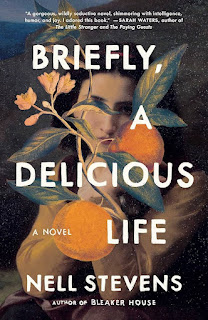'Paradise Rot' - Review
This debut novel of Norwegian artist and musician Jenny Hval follows exchange-student Jo, newly arrived in different country and and forced to live with a stranger in a former brewery, now made into a “livable” apartment with sheets of drywall that don’t even reach to the ceiling. Life within this new space feels different than that outside - stuffy and damp with sounds and smell that seem ever-present - and soon Jo finds herself changing as well, away from the person she arrived as.
Biology-student Jo is, above all else, a scientist. She watches with, up until the end, very little action. She watches her roommate Carral sleep in the mezzanine of their practically-cardboard house, leafs through her books, listens to her urinate with the sounds echoing through the old factory, makes eye contact with her from across the house as Carral has sex. She watches, also, as apples soften and rot in all corners of the house, moss sprouts on the stairs, mushrooms pop up before her very eyes on the lip of the bathtub. Carral too, and Jo stands by and observes as she softens and swells, oozes and seeps beside her in bed. There’s a romance between them, or at least some obsessive sapphic codependency. Jo shifts to her environment, leaving Norwegian Johanna behind to be Carral’s Little Jo. It’s not even until midway through the book that Jo can even see this, so fixated in observing the environment around her that she does not realize that she’s adopted Carral’s way of speaking, her accent, her mannerisms.
The undercurrent of Jo’s biology studies flow through the book as well and usher in each wave of earthy rot. Her study of the fungi precede a bag of apples rotting throughout her house. She learns about sporing mushrooms before her bathroom becomes it’s own ecosystem with yellow moss and white mushrooms. These biological changes aren’t just seen in their house, but in the characters themselves, with Carral becoming swollen and puffy before Jo’s eyes, dewy in a way that sticks the two of them together. There’s something creeping about the house, as if the rot itself is inescapable if Jo isn’t able to pull herself away.
Paradise Rot is, above all things, visceral. The reader is struck the earthy scent of mold, the sound of the uncomfortably thick flow of urine coming from the bathroom, the sight of shiny-slick sweat on the back of a body that you aren’t supposed to be watching. Hval puts the reader right in the middle of this brewery-sized terrarium, an outsider in this semi-fantastical world alongside Jo. For the weak of heart, perhaps be weary but otherwise, Paradise Rot is a page-turning and eyebrow-raising tale of identity and the grotesque within us.
.png)

Comments
Post a Comment